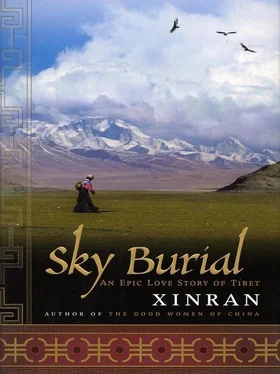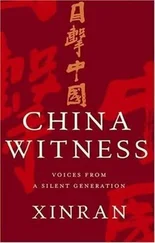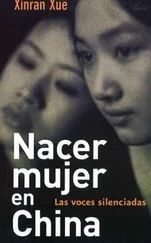SHU WEN didn’t tell me where Kejun’s first army posting was. Perhaps she didn’t know. What she did say was that he was away for two years.
I asked her whether she and Kejun wrote to each other. Shu Wen gave me one of her hard looks that made me ashamed of my ignorance.
“What kind of postal system do you imagine there was?” she asked. “War had created enormous upheaval. All over China, women were longing for news of husbands, brothers, and sons. I was not the only one. I had to suffer in silence.
“I heard nothing from Kejun for two years. Separation was not romantic, as I had imagined-it was agony. The time crawled past. I thought I was going to go mad. But then Kejun returned, decorated with medals. His unit had sent him back to Nanjing to take an advanced course in Tibetan language and medicine.
“Over the next two years our love grew stronger. We talked about everything, encouraging and advising each other. Life in China seemed to be getting better day by day. Everybody had a job. They worked not for capitalist bosses but for the government and the motherland. There were free schools and hospitals. We were told that, through Chairman Mao’s policies, China’s economy would catch up with those of Britain and America in only twenty years. We also had the freedom to choose whom we would marry, rather than obeying the choices of our parents. I told Kejun about how our friend Mei had, to everyone’s surprise, married Li, an unsophisticated country boy, and how Minhua, who seemed so meek, had eloped with Dalu, the head of the student council. Their parents had come to the university to complain. But I didn’t tell him how, while he was away, I had had other admirers, and people had advised me not to pin my hopes on a man who risked death on the battlefield.”
“WHEN KEJUN finished his studies, we decided to get married. He was awaiting orders from the military headquarters in Nanjing. I was working as a dermatologist at a big Nanjing hospital. In the eyes of our friends, many of whom had children, we had already waited late enough to marry. Kejun was twenty-nine, I was twenty-six. So we applied to the Party for permission. Although my father found it difficult to get used to the idea of free choice in marriage, he was very fond of Kejun and knew I had made a good decision. In any case, if I delayed marriage any longer, he would lose face. My older sister had already got married and had moved to Suzhou, taking my parents with her.
“Our wedding was celebrated in true ‘revolutionary style.’ A high-ranking political cadre was the witness and friends and colleagues wearing little red paper flowers were our escorts. For the refreshments we had three packets of Hengda cigarettes and some fruit candies. Afterward we moved into the hospital’s married quarters. All we owned were two single wooden plank beds, two single quilts, a rosewood chest, a red paper cutout of two ‘happiness’ characters, and our marriage certificate decorated with a portrait of Chairman Mao. But we were ecstatically happy. Then, only three weeks later, Kejun’s call-up papers arrived. His unit was to be posted to Tibet.
“We hardly had time to absorb the news before he left. The army arranged for me to be transferred to a hospital in Suzhou so that I could be close to my parents and sister. We hadn’t requested a transfer but the Party organization said that it was only right that army dependents should have their families to look after them. I threw myself into my work so that I didn’t think about how much I was missing Kejun. At night, when everyone else was asleep, I would take out Kejun’s photograph and look at his smiling face. I thought all the time about what he had said just before he left: that he’d be back soon because he was anxious to be a good son to my parents and a good father to our children. I longed for him to return. But instead I received a summons to the Suzhou military headquarters to be told that he was dead.”
We sat in silence together for some time. I did not want to interrupt her thoughts.
THAT NIGHT, Shu Wen and I shared a room in the small hotel next to the teahouse. During the two days we spent together, she opened up to me in a way that I had hardly dared hope.
But a few days later, when I called the hotel in Suzhou, she had already left. In a panic, I contacted the man who had called me about her.
“I don’t know where she’s gone,” he said. “The other day she sent me a packet of green tea via the rice seller to say thank you for introducing her to Xinran. She said she hoped you would tell people her story. Since then I haven’t met her again.”
It was not until I went to Tibet again in 1995 to make a documentary that I began to understand what it might be like to live there. I and my four cameramen were rendered speechless by the emptiness of the landscape, the invisible wind that swept across the barren land, the high boundless sky, and the utter silence. My mind and soul felt clean and empty. I lost any sense of where I was or of the need to talk. The simple words that Shu Wen had used-“cold,” “color,” “season,” “loss”-had a new resonance.
As I wrote Shu Wen’s story, I tried to relive her journey from 1950s China to Tibet-to see what she saw, to feel what she felt, to think what she thought. I deeply regretted having allowed Wen to leave without telling me how I could find her again. Her disappearance continues to haunt me. I dearly wish that this book might bring her back to me and that she will come to know that people all over the world are reading her story.
2 I CAN’T LEAVE HIM IN TIBET, ALONE
Death Notice
This is to certify that Comrade Wang
Kejun died in an incident in the east of
Tibet on 24 March 1958, aged 29.
Issued by the Suzhou Military Office,
Jiangsu Province, 2 June 1958
Wen stood stunned on the steps of the military headquarters, the summer rain of the Yangtze delta monsoon drenching her hair and face.
Kejun, dead? Her husband of less than a hundred days, dead? The sweetness of those first days after their marriage lingered in her heart. She could still feel their warmth. Of those hundred days, they had only spent three weeks together. It was impossible that he was dead.
He had been so strong, so talkative, so full of life when he set out for Tibet. An army doctor wouldn’t have been directly involved in the fighting. What “incident” was this? How did he die? Why could nobody give her any information? They had not even added a few words to testify that he died a revolutionary martyr as they always did for soldiers who fell in battle. Why not?
In the flood of buoyant “Reports of Victory from the People’s Liberation Army on Entering Tibet,” there had been no mention of an incident in which Kejun could have died. Staff at the military office responsible for comforting the widows and orphans of fallen soldiers had told Wen privately that they hadn’t received any of the standard battlefield bulletins from Tibet.
Wen stood in the Suzhou street, unheeding of the rain. The busy life of the town continued around her, but she noticed nothing. An hour passed, then another. She was soaked in sorrow and bewilderment.
The chiming bells of Cold Mountain Temple called her back from her grief. Returning to the hospital where she worked, truly alone for the first time, a thought flashed through her mind. What if Kejun had simply been separated from his unit, like all those soldiers who were mistakenly reported dead when they were actually on their way home? Perhaps he was in danger or had fallen ill. She couldn’t leave him in Tibet, alone.
THE IDEA, conceived in that chill rain, that she should go and find Kejun proved to be so powerful that, despite all the attempts of her family, friends, and colleagues to talk her out of it, Wen was determined to join her husband’s regiment and travel to Tibet. She rushed around every government office she could find, tearfully thrusting her marriage certificate, Kejun’s parting note, even his few personal possessions-his towel, handkerchief, and tea mug-at everyone she saw. “My husband must be alive,” she insisted. “He wouldn’t abandon his new wife and the future mother of his children.”
Читать дальше












